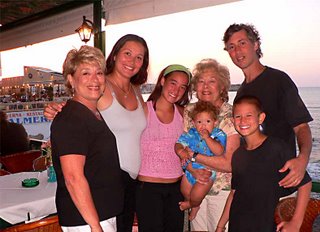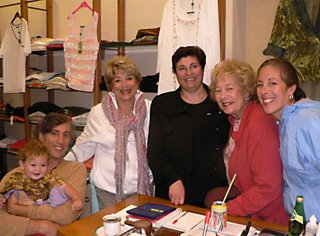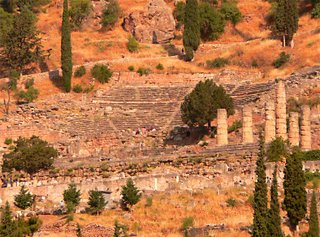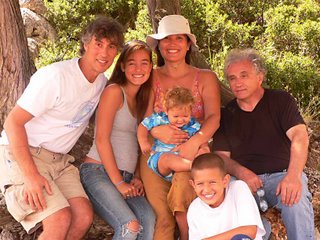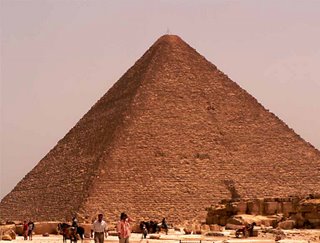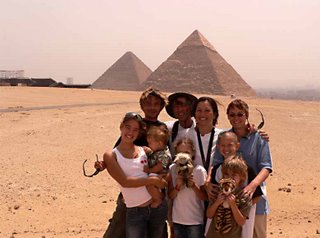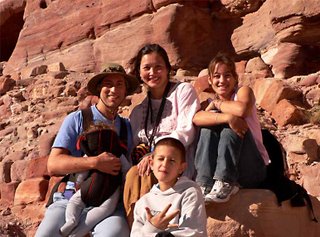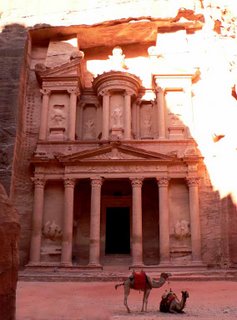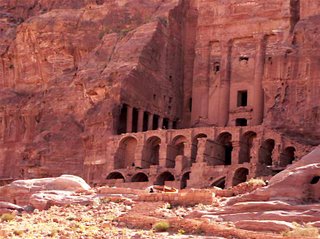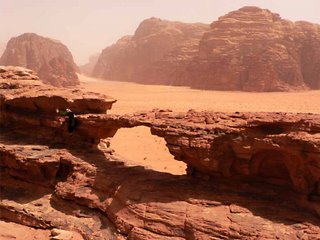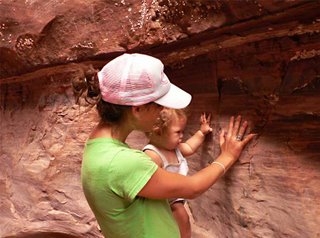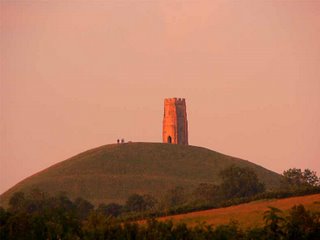
England- Loss, Healing, and Recovery
June 28-July 26, 2006
Arrival in England
We get up at 5 am in the morning after staying in a motel near the Athens airport to fly out of Greece. We’re on our way to London, England to find a camper van and travel through Europe for the next 6 months.
The man at the Enterprise car rental company, Christo, is so gracious to us in helping us find things we need that we invite him to come visit us in California when he comes to the United States. It is a relief to be in England, it is a long time since we have been in an English speaking country, even though the accents can seem like another language.
We decide to go straight to Glastonbury, an ancient magical city, and do research about vans from there. As I’m driving the 2 ½ hours to get there, jet lag and exhaustion set in and I am questioning this decision to go to Glastonbury. When all the places we call about rooms for the night are either booked full or frightfully expensive, the voices of condemnation in my head start to get louder. We are finding out the prices in England are the same price as in the States except our dollars are worth half as much here. For example, the nicest room and most reasonably priced we called is £100, but to us it’s like paying $190. Ouch! Now the demons are shouting to me, “Gabriel, you should have stayed near London where most of the vans are, we were right near the Travel Lodge and could have stayed there and blah blah blah. Layers of exhaustion have descended upon me, I’m irritated by everything and don’t know where to go. Such is traveling on the road at times. By the grace of God, the place we had called at £100 is a cottage called Middlewick on 16 acres, it is near the magical Glastonbury Tor and sits on the major ley (energy) line of Glastonbury. It’s exquisite, and the proprietors allow us to stay for 2 more nights for half price. After that they’re booked; as I’ve said, by the grace of God. Of course, as it develops, these proprietors, Wendy and Judith become our friends. Those voices of fear are now shown to be pure imposters. Wendy and Judith send us to another B&B just down the road where Jean Frye lives and rents out part of her house when they are overfull. We stay with Jean a week and are at home in her wonderful place and with her hospitality and grandmotherly care. After that we return to Middlewick for a week .
Glastonbury is a wonderful town, a bit like Santa Cruz without the ocean. There are crystal shops, metaphysical bookstores, a health food store, seminars and workshops offered, people wear colorful and grandiose clothing. There is a lot of creative energy here, there is magic rooted here. I love it. I had come here about 8 years ago to take a crop circle symposium; the town is just as vibrant now as it was then. But months of travel and stress are catching up, I’m exhausted, have had diarrhea for months and all I want to do now is rest and sleep extra. On the second day here after doing most of nothing, we hike up to the Tor from our cottage. Elijah sings the whole way up to the top non stop. He makes the cutest sounds and has such a magical voice. He makes me laugh. Matt and Kate are not thrilled to be hiking and trudge along, bickering with one another. When we get to the top, Elijah is thrilled and looking around. He hears someone playing a didgeridoo and is curious and wants to move in closer, I think he wants to eat it, but he does that with everything, including stones. We listen a bit and soon go back down as it is about to get dark. As soon as we head back down, he is quiet and without another sound he goes to sleep the rest of the way back. Amazing.
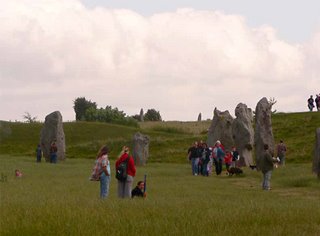
Later that week we visited Avebury and as we are leaving the site and still in view of Silbury Hill, another mystical and mysterious place next to Avebury, I spot what appeared to be a crop circle. I stopped the car to look and met two men with recording equipment, binoculars and cameras, standing alongside the road. They informed me that it was not a real crop circle, rather it was a formation made by men. These two men, Robert and David, are very serious researchers into the realm of crop circles and UFOs and shared with us their experience with aliens and crop circles. We found it riveting to listen to their stories. One of the ways to tell if a crop circle is authentic is to examine the stalks of the crop. In authentic circles, the shaft will be bent almost all the way over, and instead of breaking as they normally would at that angle, they are as if they grew that way with no breaks.
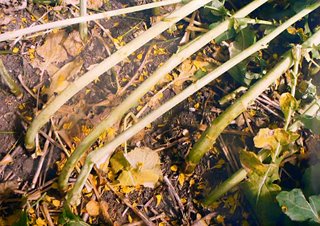
We end up staying in Glastonbury for almost 3 weeks. In addition to seeing Avebury we did see a few local sites like Chalice Well in Glastonbury, but we have mostly rested and recuperated. There is a reason; something vitally important must be confronted in Glastonbury before we can continue our journey.
The Loss of our Baby Girl – July 14, 2006
A Powerful Lesson About Life
In the midst of our angst and disillusionment while in Israel, Gabriel and I conceived. It was a difficult time for us individually due to the extreme feelings of sadness and shame we were feeling about the Israeli and Palestinian situation. As a result, our relationship became strained as Gabriel immersed himself in the study of this situation and I felt lonely and saddened in my own way, even feeling a bit abandoned. For several days there was tension between us and it was difficult for both of us, and for the kids. Elijah was also affected by this time and showed us through crying more and not finding comfort at night as he slept. When we finally spilled our guts out to each other and came back into our hearts, we rediscovered the basis of our marriage, one of kindness, love and support. We stopped looking just at our own feelings and met at the door of compassion. Compassion for the people on both sides, the Israelis and the Palestinians, and compassion for the feelings we were both experiencing.
Upon retrospection I realized that when there is disharmony in our family and in our relationship, we all suffer. The energy between Gabriel and I is so strong that when it is not aligned, there is no faking it. We both became immobilized in taking care of what needed to be handled or in creating things as part of our purpose. In these times we certainly weren’t available in meeting others and found we just added to the disharmony of the world. We have both felt very strongly that it is our responsibility and our gift in this life to bring more light into the world.
We had been talking about having a little girl. Kate kept asking, “Could you please give me a baby sister?” I guess having a baby brother is nice, but Kate has dreams of dressing up our little girl in pink and frills and I’m sure her plans include taking her baby sister shopping and doing other fu-fu things with her. Well, on May 18th, after resolving a brief but overwhelming period of disharmony, we conceived; both Gabriel and I felt immediately that this was the energy of a new baby girl.
I was overjoyed. Gabriel was concerned and less than enthusiastic. Men are funny that way. He had been less than enthusiastic after the conception of our first child Elijah, but that had dissolved after a few hours, when he joined me in joy (see the Story of Elijah’s birth on our web site at: http://gabriel-icasiana.com/Elijah/ElijahBirthStory.htm). This time it was different. I tend to forget the realities and difficulties inherent in traveling with a family of five where one of the five is a needy breastfeeding infant. Being pregnant would add a whole new level of demands on my energy levels that Gabriel was concerned about. These issues were of no concern to me and I felt overjoyed about being pregnant again. When I was reminded, I remembered for a moment and then went back to being overjoyed! Kate and Matt were excited too, especially Kate.
As the fetus grew in my belly Gabriel would scan my body energetically and he felt a disturbance, he felt something was wrong. I would also scan my belly and just feel the magnetic pull of this new being in my body. My body quickly reacted and I started with cravings and feelings of nausea. This time I was craving sour things, but I was glad I was still craving ice cream as I did with Elijah. I wanted lemons and lemon-drop sucking candies. My belly started to protrude; actually part of it was the weight I had not yet lost from Elijah’s birth 9 months ago. My breasts, already filled with milk, seemed to swell even more. I did feel overwhelmed at times, and would go through almost daily crashes of my energy levels when I would get hungry, at least that’s what Gabriel would inform me of. I didn’t really notice that, as a matter of fact, I let him know that I was noticing that he had tendencies toward being a control freak. Anyway, I would stroke my belly throughout the day and be overjoyed by the life growing inside.
At just over 7 weeks pregnant I started to bleed. First spotting and then more blood started to flow from me. Gabriel and I asked our new friends in Glastonbury, who were the proprietors of the B & B we were staying in, where the nearest hospital was. We were concerned about what might occur in case the bleeding became hemorrhaging. The feelings of doom and sadness began to creep in. I knew this wasn’t a good sign. Gabriel and I spoke frankly about the disharmony we were experiencing around the time of the conception of this little one and how different it had been with us when Elijah was conceived. When Elijah was conceived it was the day after we had become engaged and also after we had participated in a healing and transformational ceremony that had left us feeling blissfully connected. He had been conceived and he developed in a magical and sacred container. This time was a struggle through emotional disharmony and physical exhaustion. When we were in Egypt right after the conception in Israel, I had gone through days of being miserable from the extreme heat (reaching oven temperature of 125 degrees), and I had spent quite a number of evenings not sleeping when the air conditioner didn’t work. I had been exhausted and Gabriel said I was just a tad disagreeable, but I don’t know what he was talking about. We had strong feelings that the container in which I held the developing new being was compromised and we were concerned about the health of the baby.
As the days went by and I continued to bleed, we realized that this baby would not survive. There were times when I felt utterly responsible and started to blame myself. My mind took out the hammer and started beating me up with accusatory questions and assaults of blame: How could you miscarry? Your mother had 13 babies and all of them were fine. All 4 of your sisters have had babies and not one miscarriage in the Icasiano and Barrs side of the family, how could this happen to you?
Our loss also brought to the surface the buried shadowy demons of my past, of the secrets of a teenage girl, afraid to speak of the unspeakable, or to ask for help when she was in trouble. I was a guilt-ridden Catholic girl who got pregnant at 17 and felt my only alternative was to have an abortion and put this terrible secret to rest buried for the past 28 years, but secrets never rest, they eventually bubble back up to the surface until the truth is spoken.
The lies, the unspoken truths, and the shame became unwanted baggage that I carried around for 28 years. I wasn’t even aware of this debris that was clogging up my systems of awareness, consciousness and receptiveness. I had no idea how this debris had clouded my experiences and affected the choices I had made. Now the veil had pulled away and I was seeing how it had affected me.
God needs us to resolve these kinds of traumas and shames from the past in order to heal the deepest, darkest pains that block our hearts and eclipse our capacity to show up in the world with our true brilliance. Our loss today was more powerful, more potent medicine than all of the counseling, confessions and healing work I had done up to that point over the past 28 years. I am so grateful for the blessing of reliving and actually feeling the pain and the suffering of my younger self, now 45. How afraid I was and how alone I was. No partner, no one to share this pain with. I never felt I could talk to my family about this; especially my mom who I always believed was a saint. How could I admit my shortcomings, my carelessness, let alone the fact that I got pregnant which meant I had sex with a boy/man. I remember now how I thought of all the things I could say at the time, but somehow the truth never made it out of my heart or my mouth. I even thought maybe I could feign Immaculate Conception, but I was way too cool for that at 17. So I had my terrible abortion, alone, at a planned parenthood and drove myself back to work so I could continue my life as if nothing happened and pretend that nothing was wrong. I tried to escape from my reality by leaving home shortly after and moving from Oklahoma City back to my soul’s home, California. My secret was safe, no one ever found out. I remember a few years ago when I told Gabriel about my having an abortion he was supportive and caring and helped me through several layers of healing with his reconnection and chiropractic gifts. Sadly, I was never able to speak my truth with Kate and Matt’s father for fear of his judgment. So he never knew of this secret even after 18 years of being together. He had told me once early on, “I don’t want to know about or hear about your past. Your past is the past and it should be kept there”. Sounds like good advice when you want to please someone or if you have secrets, but very damaging if you want to cleanse and revitalize your soul to heal or have an intimate relationship based on truth.
Now, today, I could feel the pain, experience the loss and share the feelings with my husband and my family. Kate and Matt have been able to talk about their sadness and give me their support as we heal as a family, a family who lost this little being. We even mentioned how horrific it would be if we were to lose little Elijah, what a precious being he is in our family, and how he has touched us so profoundly in his first 9 months of life.
One of the greatest lessons I have learned throughout this walk and especially through this time is that of complete and utter surrender. How could I protect our little unborn baby, how could I try to hold on to her life as it started bleeding away? All the protection I could provide her was inching out of my body as I walked, as I sat, as I slept. There was nothing I could do, no magic potent to stop this natural process. I could only surrender. Surrender to the process and surrender to the ensuing sadness that followed. In surrendering I found I was then able to embrace the feelings and that was the grace.
Reunion with John & Claire & their family,
And meeting new friends
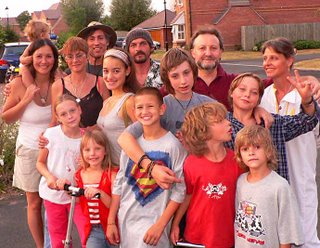
The trip is about to pick up velocity again. We have been in England almost a month as we’ve now spent more than a week in Hereford. Icasiana is doing very well now, and has gotten her strength back, and her usual rascality and vitality. We came to Hereford in our new van to see John and Claire and their children Bryony and Callum who we had become friends with in Egypt. As fate would have it, they have returned to England unexpectedly for his wife Claire to have their baby in cooler weather and a safer environment. They have introduced us to their friends Kim and Belinda, and their children Merlin, Theo, Hugo, and Natasha. We have been staying in their home as we prepare for our European journey. We have developed a very strong connection with them and we have collectively been doing profound healing work. Icasiana will talk about our experience with one healing couple in the next blog. Stay tuned. While I have been doing my own brand of chiropractic and trance journey work Icasiana has been doing counseling work as an opening and then as a closing after the work, and it has been synergistic and profound. This is very exciting for us, as we both feel we are being shown a part of our life’s work. This trip has become a lot less about visiting sacred sites and much more about creating friendships and being catalysts for others on the sacred healing journey.
We will head out to Scotland and then Cornwall in England, then on to France, Italy and Spain in our VW camper van. Scratch that, the itinerary is very much in flux right now. We just found out that the crop circle symposium is happening in Glastonbury this weekend and our friend Hamish Miller (he is a well known author, blacksmith, and dowser of the St. Michael and St. Mary lines through Europe) will be speaking there, so we must go. We may not make it to Scotland, we’ll see.
We've wanted to go to Austria, Germany, and Czech and are not sure if we'll get to those places. The impetus to go to Austria is to visit the PKS Institute based upon the work of “Viktor Schauberger”. His work from over 50 years ago was and is still revolutionary. Check out this web site about him at:
http://frank.germano.com/viktorschauberger.htm
To get to our most up to date info go to our blog site at:
http://oursacredjourney.blogspot.com
or check the web site at: www.gabriel-icasiana.com, it has more pictures from previous posts.
Thanks for joining us on our journey and we love hearing from you all,
Love, Gabriel, Icasiana, Kate, Matt and Elijah

